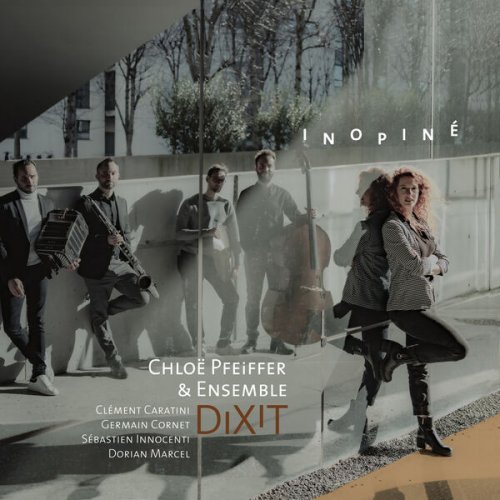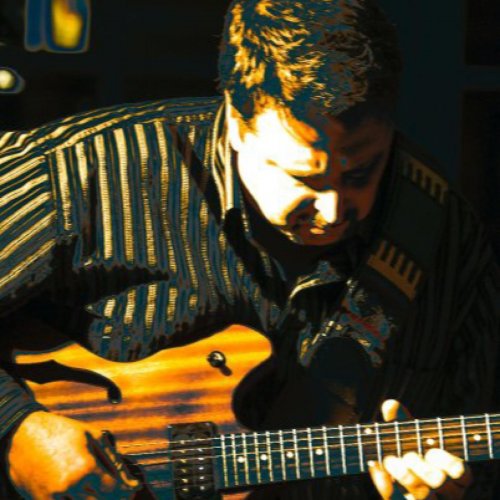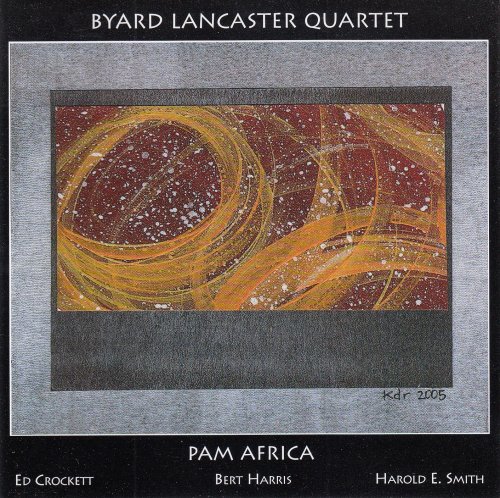Brigitte Fassbaender - Liszt, R. Strauss: Lieder (2003)
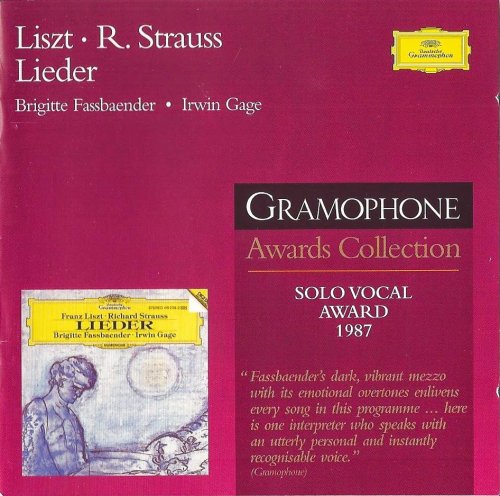
Artist: Brigitte Fassbaender
Title: Liszt, R. Strauss: Lieder
Year Of Release: 2003
Label: Deutsche Grammophon
Genre: Classical
Quality: FLAC (image+.cue,log,scans)
Total Time: 58:36
Total Size: 212 Mb
WebSite: Album Preview
Tracklist: Title: Liszt, R. Strauss: Lieder
Year Of Release: 2003
Label: Deutsche Grammophon
Genre: Classical
Quality: FLAC (image+.cue,log,scans)
Total Time: 58:36
Total Size: 212 Mb
WebSite: Album Preview
01. Franz Liszt, Vergiftet sind meine Lieder [0:02:07.50]
02. Franz Liszt, Uber allen Gipfeln ist Ruh [0:04:13.50]
03. Franz Liszt, Ein Fichtenbaum steht einsam [0:03:10.50]
04. Franz Liszt, Die drei Zigeuner [0:07:08.37]
05. Franz Liszt, Es Mus ein Wunderbares sein [0:02:08.13]
06. Franz Liszt, Oh! quand je dors [0:04:57.62]
07. Franz Liszt, Comment, dsaient-ils [0:02:31.63]
08. Franz Liszt, S'il est un charmant gazon [0:02:43.12]
09. Franz Liszt, Enfant, si j'etais roi [0:03:04.50]
10. Richard Strauss, Liebeshymnus [0:01:40.38]
11. Richard Strauss, Die Nacht [0:02:46.62]
12. Richard Strauss, Allerseelen [0:03:06.38]
13. Richard Strauss, Zueignung [0:01:45.50]
14. Richard Strauss, Morgen! [0:03:52.50]
15. Richard Strauss, Am Ufer [0:02:20.00]
16. Richard Strauss, Funf Lieder op.15 - Madrigal [0:02:35.37]
17. Richard Strauss, Funf Lieder op.15 - Winternacht [0:01:52.63]
18. Richard Strauss, Funf Lieder op.15 - Lob des Leidens [0:02:15.62]
19. Richard Strauss, Funf Lieder op.15 - Aus den Liedern der Trauer [0:01:47.38]
20. Richard Strauss, Funf Lieder op.15 - Heimkehr [0:02:26.00]
Performers:
Brigitte Fassbaender - contralto
Irwin Gage - piano
The extraordinary hold Fassbaender exerts over audiences, in the concert hall and on record, surely derives from her singular strength of personality reflected in her dark, vibrant mezzo with its emotional overtones evident in every bar she sings. Even when an excess of vibrato intervenes, which happens seldom in this recital, it seems part of the very individual and immediately recognizable Fassbaender manner.
The Liszt half of this programme was presented by the singer at a Christie's recital in London a year or two ago. Then, even though a storm beat down on the roof (or perhaps because of it), her listeners, many of them unfamiliar with Liszt's songs and without translations before them, were compelled to attention and divined the meaning of what she was relating, so meaningful was and is her diction and her colouring of the words — right from the very first, Vergiftet, and how she conveys the poison in the girl's soul.
That, and her other Liszt choices, have been judiciously made, exhibiting the composer's wayward but often pertinent style in Lieder at its best. How vivid here are the three gypsies, how rapt the telling of love's bliss in Es muss ein Wunderbares sein. The Oh! quand je dors sounds more appealing in a higher key, but Fassbaender catches its mood of unfettered ardour well enough, managing the difficult melismas in the middle and the rising phrase at the end with skill, though she takes an unwanted breath before the final "Laura." The lighter Hugo settings are done with spirit, the repeated "aimer" in Comment, disaient-ils subtly inflected, the final line "Pour un baiser de toi!" in Enfant, si j'etais roi sensually exclaimed.
Her Strauss is equally compelling. She catches all the sinuously threatening atmosphere of Die Nacht, not taken too slowly. Similarly, in Allerseelen, she avoids sentimentality at just three minutes. On the other hand, Fassbaender fully justifies the slow tempo of her account of Morgen, its timeless quality suggested both by the singing and by Irwin Gage's soft-grained postlude. Strauss's Funf Lieder are hardly on the level of inspiration of his other songs included here, the popular "Heimkehr" excepted, but Fassbaender makes out a case for them, even the oddly formal setting of Michelangelo's "Madrigal." In sum, here is one interpreter today who speaks personally to the listener, not in generalities. She and her perceptive pianist are excellently recorded. -- Alan Blyth
The Liszt half of this programme was presented by the singer at a Christie's recital in London a year or two ago. Then, even though a storm beat down on the roof (or perhaps because of it), her listeners, many of them unfamiliar with Liszt's songs and without translations before them, were compelled to attention and divined the meaning of what she was relating, so meaningful was and is her diction and her colouring of the words — right from the very first, Vergiftet, and how she conveys the poison in the girl's soul.
That, and her other Liszt choices, have been judiciously made, exhibiting the composer's wayward but often pertinent style in Lieder at its best. How vivid here are the three gypsies, how rapt the telling of love's bliss in Es muss ein Wunderbares sein. The Oh! quand je dors sounds more appealing in a higher key, but Fassbaender catches its mood of unfettered ardour well enough, managing the difficult melismas in the middle and the rising phrase at the end with skill, though she takes an unwanted breath before the final "Laura." The lighter Hugo settings are done with spirit, the repeated "aimer" in Comment, disaient-ils subtly inflected, the final line "Pour un baiser de toi!" in Enfant, si j'etais roi sensually exclaimed.
Her Strauss is equally compelling. She catches all the sinuously threatening atmosphere of Die Nacht, not taken too slowly. Similarly, in Allerseelen, she avoids sentimentality at just three minutes. On the other hand, Fassbaender fully justifies the slow tempo of her account of Morgen, its timeless quality suggested both by the singing and by Irwin Gage's soft-grained postlude. Strauss's Funf Lieder are hardly on the level of inspiration of his other songs included here, the popular "Heimkehr" excepted, but Fassbaender makes out a case for them, even the oddly formal setting of Michelangelo's "Madrigal." In sum, here is one interpreter today who speaks personally to the listener, not in generalities. She and her perceptive pianist are excellently recorded. -- Alan Blyth
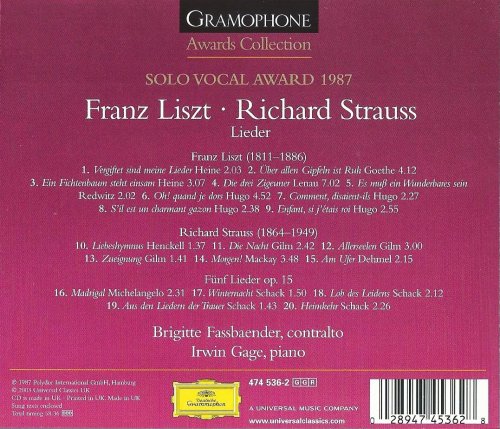
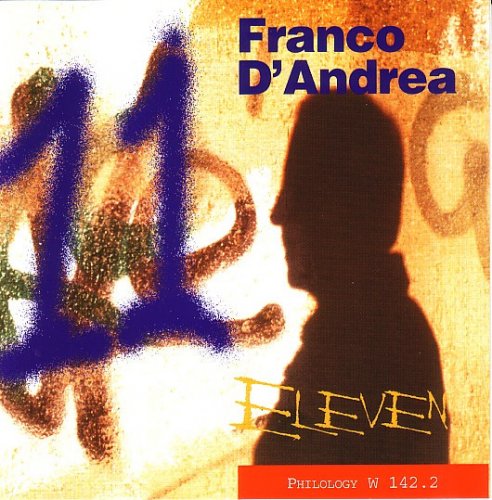
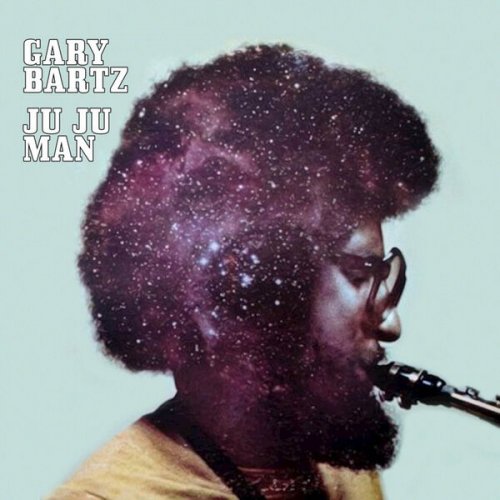
![Haeun Joo - Just Gravity (2026) [Hi-Res] Haeun Joo - Just Gravity (2026) [Hi-Res]](https://img.israbox.com/img/2026-01/16/zfy1b4k945wo2xfjdp56kv3ai.jpg)

